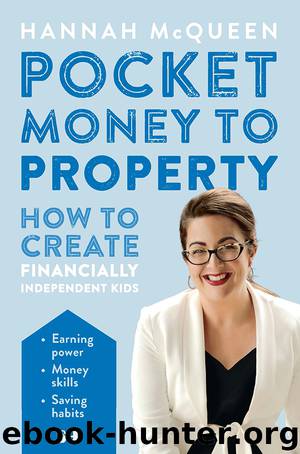Pocket Money to Property by McQueen Hannah

Author:McQueen, Hannah
Language: eng
Format: epub
Publisher: Allen & Unwin
Published: 2017-04-21T16:00:00+00:00
UNDERSTANDING HOW INTEREST WORKS
Interest rate, yield, annual percentage yield are all different ways of describing the money that a bank or financial institution pays you for keeping your money on deposit with them. It’s the money they are prepared to pay for the use of your money, because they take it and invest it themselves or lend it out to someone else.
Teach your kids that the money that sits in a cheque or transactional account should be what is needed to cover your living costs/bills for the month. Any more needs to be invested in a term deposit or something that pays you for the privilege of holding on to your money.
Interest compounds when the bank or financial institution adds interest to your savings at regular intervals and you don’t withdraw it, so you start to earn interest on your interest. Compound interest shows the power of time. The longer you leave the money invested, earning interest, the faster the money grows. To start with it is gradual, but then it hits a point where it starts to rocket away.
Show your kids with maths. If you open a savings account with $100 in the bank, and the bank is paying 6 per cent interest, divide the rate by 12 to get the monthly interest rate (so 6 per cent divided by 12 = 0.005, or 0.5 per cent of $100, which is 50 cents per month). Add that to your $100, and at the end of the first month you have $100.50. The next month the bank pays you interest on the new and increased amount of $100.50. At the end of the year you have $106.17 (slightly more than the 6 per cent interest advertised). The 17 cents in this example is not particularly exciting, but if we follow the logic, by the end of five years you will have $134 (instead of $130), and at the end of 10 years you will have $179 (instead of $160). But the real magic happens as your savings balance or the interest rate increases.
Conversely when you have borrowed a lot of money (e.g. a home mortgage) and have to pay it back to the bank, the power of compound interest will be working against you (see chapter 2 for more on this).
Einstein is said to have called compound interest the eighth wonder of the world, and it can be if the interest rate is high enough and the amount of time long enough. However, if the interest rate is so low as to be inconsequential (as it is currently), its power is lost because your savings won’t grow fast enough to show any real improvement. As parents, when you are trying to illustrate the benefit of compound interest on savings you might need to top up what the bank pays to create an illustrated rate of at least 6 per cent (ideally 10 per cent), for your child to grasp its benefits.
Compound interest can multiply money almost magically. Compound interest arises
Download
This site does not store any files on its server. We only index and link to content provided by other sites. Please contact the content providers to delete copyright contents if any and email us, we'll remove relevant links or contents immediately.
The Compound Effect by Darren Hardy(8969)
Tools of Titans by Timothy Ferriss(8398)
Nudge - Improving Decisions about Health, Wealth, and Happiness by Thaler Sunstein(7709)
Win Bigly by Scott Adams(7199)
Deep Work by Cal Newport(7085)
Rich Dad Poor Dad by Robert T. Kiyosaki(6637)
Principles: Life and Work by Ray Dalio(6453)
Pioneering Portfolio Management by David F. Swensen(6301)
Digital Minimalism by Cal Newport;(5765)
The Barefoot Investor by Scott Pape(5746)
Grit by Angela Duckworth(5615)
The Slight Edge by Jeff Olson(5419)
Discipline Equals Freedom by Jocko Willink(5390)
The Motivation Myth by Jeff Haden(5213)
You Are a Badass at Making Money by Jen Sincero(4931)
The Four Tendencies by Gretchen Rubin(4604)
Eat That Frog! by Brian Tracy(4542)
The Confidence Code by Katty Kay(4264)
Bullshit Jobs by David Graeber(4192)
